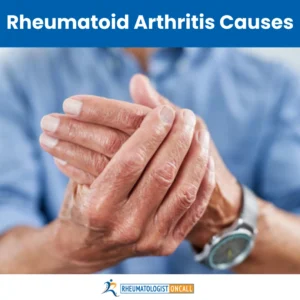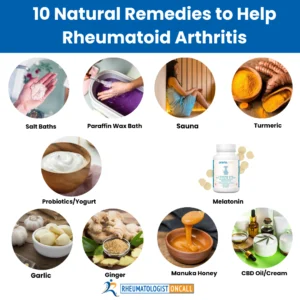SHARE
Waking up with stiff joints?
Feeling unexplained fatigue?
It’s not just aging; it might be Rheumatoid Arthritis (RA).
This condition affects numerous people, making daily life a challenge. In this blog, you will learn more about
- What is Rheumatoid Arthritis (RA)?
- What are Rheumatoid Arthritis signs?
- Why does Rheumatoid Arthritis occur?
- How is life with Rheumatoid Arthritis?
- What are the treatment options?
What is Rheumatoid Arthritis (RA) ?
Rheumatoid Arthritis isn’t just about aching joints. It’s an autoimmune disorder that causes the body’s immune system to attack its own tissues, primarily affecting the joints and leading to pain, swelling, and potential deformities.
Rheumatoid Arthritis Symptoms
RA is widely recognized for its impact on the joints, but it offers a wider array of symptoms:
- Joint Pain & Swelling: Often starts in small joints of the hands and feet.
- Fatigue: Not just tiredness, but a profound sense of exhaustion.
- Morning Stiffness: Lasting for hours, making daily tasks challenging.
- Systemic Signs: Including low-grade fever, dry eyes/mouth, jaw pain, rashes, and nodules on elbows.
- Affected Joints Include Wrists, elbows, shoulders, cervical spine, hips, knees, and ankles.
Why Does Rheumatoid Arthritis Occur?
RA is not a disease that is inherited, and the current belief is that it is caused by a combination of factors, from viruses to environmental and hormonal changes.
- Genetics: Certain genes can heighten risk. If you have a first-degree relative with RA, then your chances of developing the disease are two times higher.
- Environment: Exposure to agents like smoking or silica dust.
- Hormonal Factors: RA is more common in women.
Life with Rheumatoid Arthritis
RA is a lifelong journey. And while it may not be curable, it is manageable with the right care and strategies. Here at Rheumatologist OnCall we focus on treating patients with RA from the diagnosis to the worst flare-up episodes. What are flare-ups?
- Flare-Ups: These are periods of heightened disease activity. Sometimes flare-ups develop due to high stress, due to lack of sleep, or due to eating certain foods. Learn more about managing flare-ups from Dr. Girnita’s YouTube video.
- Remission: Times of reduced symptoms, often due to effective medication.
Rheumatoid Arthritis Treatment

Fortunately, in our days, there are many options to treat RA. The best way of treating RA will be a combination of medications, supplements, and lifestyle modifications that are scientifically proven to work best for RA patients. This is our approach at Rheumatologist OnCall. We treat the patient and not their disease, as we believe every patient with RA is unique.
- Medications: Including anti-inflammatories, DMARDs, and biologics.
- Physical Therapy: Vital for retaining and enhancing mobility.
- Surgery: In advanced stages, joint replacement can be a consideration.
Rheumatoid Arthritis Complications
RA affects more than just the joints:
- Mental Health: Coping with RA can lead to anxiety and depression.
- Heart Disease Risk: Chronic inflammation may elevate cardiovascular risk.
- Daily Challenges: Simple tasks might require adaptations.
Conclusion
Rheumatoid Arthritis (RA) needs a comprehensive understanding, an empathetic approach and effective management. For those battling RA, know you’re not alone. With experts like Dr. Girnita and the Rheumatologist OnCall team, a fulfilling life with RA is more than possible—it’s a promise.














